I’ve known for some time that a pest preys upon my junipers, but I had yet to see the creatures until yesterday. I poked around a bit and found the following.

Caterpillar!
I’d seen caterpillars in junipers before – nasty creatures that look like scale foliage and can eat through a tree’s new growth in a single day. These are lazier. They seem to tuck away amongst the foliage and hang out. The signs are subtle – sometimes just a few needles turn brown.
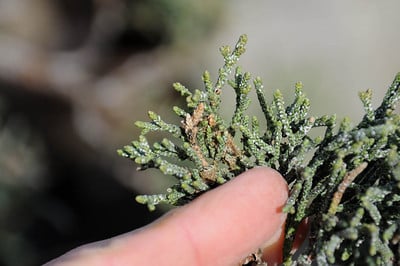
Caterpillar damage on a Western juniper
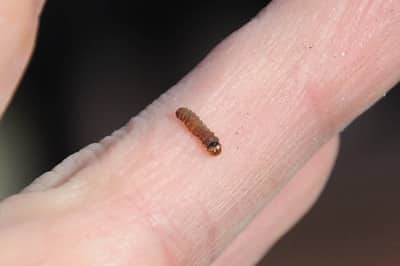
The culprit
It didn’t take much to coax the creatures out of their hideouts.
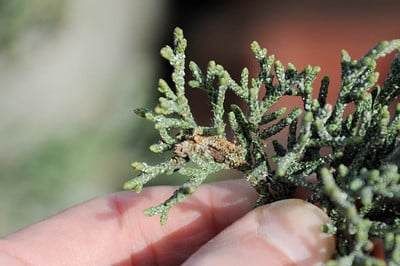
Caterpillar damage
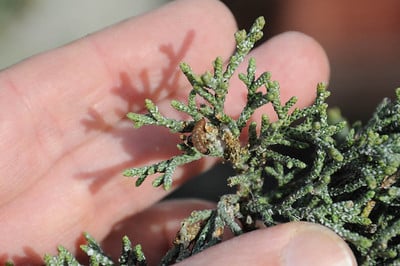
Creeping out into the light
They were particularly insidious in Sierra juniper, fitting perfectly inside single needles.
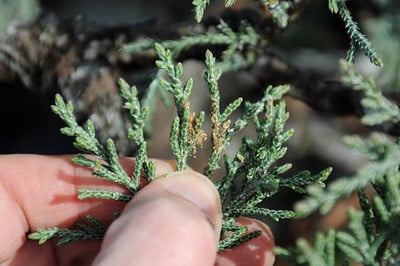
Tell-tale signs
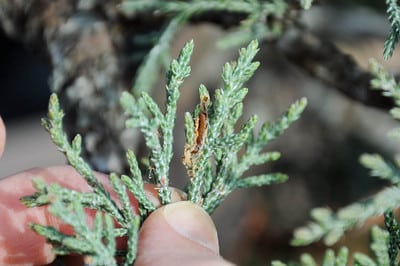
Caterpillar caught hiding in Sierra juniper foliage
I don’t what kinds of caterpillars these are or the best way to eradicate them. I welcome any suggestions! I checked the trees’ foliage carefully and removed every one I found manually. I then sprayed the trees with a mild pesticide. I’ve found that the best way to manage pests in my yard is to get to the bugs early in the season. I’m a bit late this year – once pests take hold in Spring it can be tough to completely get rid of them. I’ll be checking my trees extra carefully for the next month or so.
Subscribe to Bonsai Tonight
New Posts Delivered Every Tuesday and Friday
Andrew Ward says
Not sure of the availability of this product in countries outside of Australia … we have a product that is marketted as ‘Dipel’.
The Yates Website refers to this bio-insecticide as:
‘Dipel takes effect almost immediately after it’s eaten, so it should be sprayed onto plant material as soon as caterpillars make their appearance. Best results come from spraying all over and under the leaves so that, while the caterpillar’s feeding, it’s ingesting as much Dipel as possible. Caterpillars infected by Dipel cease feeding almost immediately and die within one to four days. Dipel is now registered to control caterpillars on all vegetables, fruits, vines, herbs, shrubs, flowers and trees. White cabbage butterflies, cabbage moth, loopers, budworms and vine moth caterpillars are some of the most common leaf-eating and flower spoiling pests that can be controlled with Dipel.’
I have certainly found the product to be useful in Australia. Good luck!
Nuno Encarnação says
Hi Jonas!
I don’t use Dipel, but I have a similar product wich is called Turex, wich acts in the same way. The main compound is a bactheria called Bacillus thuringiensis that infects the catterpillar and it immedatly stops eating. There are many products that use this bactheria and are available in stores speciallized on biological agriculture.
I have a 2 years old son at home so I try to use products with minimum toxicity.
matthiew quinn says
http://gardenline.usask.ca/pests/bt.html
Bacillus Thuringiensis it’s a bacteria … kills all larvelike pests, and like our friend nuno said it’s bio… safe, it’s found naturaly in the ground if i understand right…
but they use this agaisnt butterfly larva that eat cabbage so…
hope this helps. i study in horticulture in Montreal and this is what they suggest at the botanical garden here,.
take care .
Matt
AlexV says
BT is a great pesticide because it is only toxic under basic conditions. Insect guts are basic so the molecule forms spiky aggregates that slice up the insects guts. Humans have acidic guts which neutralizes the toxin. It is good stuff.
It has been at the heart of the GMO argument because Monsanto inserted the gene into corn so the corn produces the BT toxin.
Anyways, as a microbiologist I always recommend using something in tandem with BT which will help to kill off BT resistant pests which is what you get when you wipe out everything with a single pesticide.
Good luck with the caterpillars Jonas!
Alex
Genevagear says
Bayer 12 Month Tree and Shrub Insect Control Formula is a good systemic. I know many bonsai enthusiasts that use it on their trees.